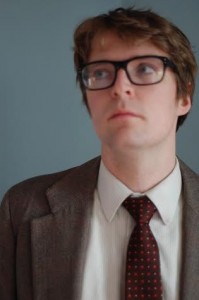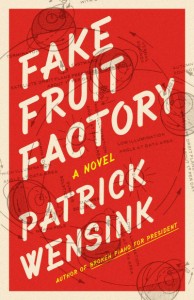Interview: Patrick Wensink
 Midwestern Gothic staffer Giuliana Eggleston talked with author Patrick Wensink about his influences, the endless freedom of fiction writing, comedy as honesty, and more.
Midwestern Gothic staffer Giuliana Eggleston talked with author Patrick Wensink about his influences, the endless freedom of fiction writing, comedy as honesty, and more.
**
Giuliana Eggleston: What’s your connection to the Midwest?
Patrick Wensink: I lived in Ohio for the first 22 years of my life. I grew up in a small town in Northwest Ohio called Deshler and then went to college at the University of Dayton. Since then I have lived in Arizona, Oregon and Kentucky.
GE: How does being from the Deshler, Ohio influence your writing, specifically your most recent work, Fake Fruit Factory?
PW: Guilt is the engine that powered Fake Fruit Factory. I love my home town and the quirky childhood it afforded me, living in a community of 2,000 people. Being free to ride my bike where I pleased and having the safety and independence a small town gives kids. Plus, we lived out in the country, outside of the actual town and didn’t have any cable, so I had to play make-believe a lot, which has given me a fertile imagination as an adult.
I knew I wanted to write a book that took place in a small Deshler-like town that was struggling to survive, much like my hometown is these days. What surprised me was that I realized my motivation to explore small town America was from guilt. Here I was, pontificating on why little towns and villages fail and it became clear that people like me are just as much to blame as factory work going overseas. Pretty much everyone I graduated with that went to college moved away. If I had stayed and maybe others, could we have helped build a stronger, more sustainable town? Maybe. I’ll never know.
GE: You write nonfiction, fiction and children’s books. How do you approach each type of writing? Does your process differ for each? What draws you to each type of writing?
PW: Absolutely, the different demands each lays on me is the key. I like the endless freedom of fiction writing. But sometimes I enjoy the necessary simplicity of kids books, which is very difficult to do. Other times, I really need to interview people and try and figure out what makes them tick for a nonfiction piece.
My method of working is to focus on one thing passionately until I burn out and then set it aside for months. So, for example, in the five years it took me to write Fake Fruit Factory, I put it aside several times. Once, to embed myself in the truly bizarre world of Christmas tree salesmen for Men’s Health magazine. When I finished that I was sick of interviewing people and writing about their lives, so I switched gears to kid’s books for a while until I finally came back to Fake Fruit Factory and started the process over again.
 GE: Your most recent work, Fake Fruit Factory, is comedic in nature. What draws you to that style of writing?
GE: Your most recent work, Fake Fruit Factory, is comedic in nature. What draws you to that style of writing?
PW: Comedy is the easiest way to portray honesty to me. You can explore the truth much easier through comedy. You can say a lot of difficult things, like small town America is dying, when you wrap it in a laugh. People will listen to jokes over someone wagging a finger in their face, in my experience.
GE: In Fake Fruit Factory, you create a small town in Ohio. What was most difficult about creating an entirely fictional town?
PW: Connecting all the dots. Fake Fruit Factory has about 12 main characters intersecting throughout the story, much like how the lives of everyone in a small town overlap. I had elaborate charts and graphs drawn up to ensure everyone’s story made sense and had an arc while they fought against one another to prove THEIR idea for saving Dyson is best.
GE: What were your experiences like growing up in Deshler, Ohio? Did you model the town you created after your own town at all? If so, how? Was any research required?
PW: It’s a very fictionalized version of my hometown. I took the elements that make it a realistic place and then distorted them. I think Stanley Kubrick said, “realistic is good, but interesting is better.” I tend to follow that model when writing.
GE: How would you describe your writing process? What steps have to happen before you can begin writing? How do the ideas you have form into something concrete?
PW: My writing never comes from something concrete. I don’t do any outlining and do very little planning. It starts with an idea or two that I just can’t get out of my head and with an opening scene in mind. From there I adventure forward, hoping to surprise myself. Sometimes it works, sometimes it doesn’t. Fake Fruit Factory is my third published novel, but I probably have double that number in a drawer at home because the story couldn’t keep moving forward and eventually had to be abandoned.
GE: Are there any writers that you feel have influenced your work?
PW: I like reading writers that make me feel like garbage. By that I mean, I love reading someone who is so strong that it makes me feel like I’m not working hard enough and not doing a good enough job. That’s the kind of thing that motivates me to go forward. Don Delillo and Flannery O’Connor are my favorites in that department. Robert Kloss was the last contemporary writer to make me feel that way.
GE: What’s next for you?
PW: I am very close to announcing a very exciting project. Paperwork is not signed, so I have to keep quiet on details. But it will be a large middle grade book for HarperCollins aimed at 8-12 year old boys. I’ll be writing it with a pretty well-known musician and TV personality.
It will be weird and fun, I can promise you that!
**
Patrick Wensink is the author of five books, including the bestselling novel, BROKEN PIANO FOR PRESIDENT. His work appears in New York Times, Esquire, Oxford American, Salon, and others. In 2017, HarperCollins will publish his first children’s book, Go! Go! Gorillas. He lives in Louisville, KY with his wife, son and fragile ego.






